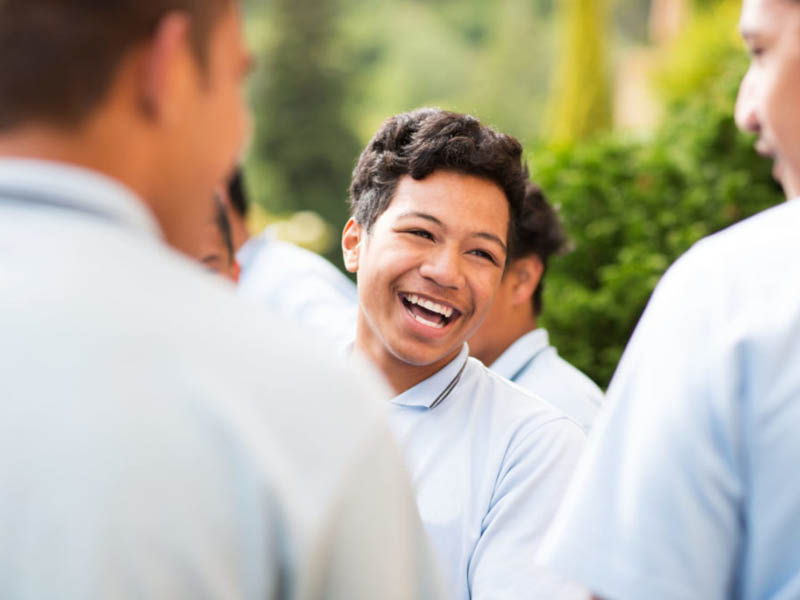About the Programme:
Developed in collaboration with Emeritus Professor Russell Bishop, Relationships First is an evidence informed wrap-around framework that works to increase equity through transforming classroom, leadership, and system practices, creating a culturally responsive context for learning.
Relationships First supports educators to build relationships with students, with a specific emphasis on marginalised students. Cognition Education’s programme is based on over a decade’s worth of research into what works best for indigenous and minoritized students, looking at the factors necessary to transform their schooling experience from one of failure, to one of success. This research is considered to be one of the most powerful contributions to educational research and practice in the past 50 years.
Our Impact:
Relationships First is underpinned by the evidence that it takes all parts of the system to make significant, meaningful, and sustainable change. Cognition takes a coaching and mentoring approach, guiding stakeholders through iterative cycles of development and change, with an ultimate focus on building capability. The programme helps to grow Relationships-based Leaders of Learning; leaders who know how to build a culture of success and promote effective learning. Ultimately, leaders engaged in Relationships First will walk away from the programme with the pedagogy and skills to create unprecedented change for minoritized learners. Below are several examples of projects delivered under this programme:
- Homai School – Cognition’s work with the school since 2016 focussed on Relationships-based learning to improve culture within the school and grow collective efficacy, through an approach that emphasised learning rather than behaviour. Under this programme, Cognition’s facilitators
- Connected with students to know their point of view of success
- Coached and mentored the leadership team once a week using evidence and data to drive effective practices at the teacher level, after which the leaders mentored the whole staff in an after-school session.
- Built relationship with whānau to understand what is important to the community, and for a better buy-in
- Implemented a student-centred learning
Benefits achieved through this programme includes:
- Positive learning relationships between students and staff.
- Students are driving and taking ownership of their own learning.
- Localised curriculum including wider community.
- A change to a ‘no-blame’ mindset’ creates optimal learning conditions and interactions, resulting in improved attendance and outcomes.
- Seeking student input and co-constructing learning results in students becoming future-focused learners.
- Commitment to Relationships Based Learning has improved partnerships with whānau.
- Teachers feel empowered, resulting in zero teacher turnover.
Read the our stories here:
https://www.cognitioneducation.co.nz/relationships-rule-at-homai-school/
Nayland College – In 2015, two areas were identified as priorities of improvement for Nayland college: (i) the achievement of Māori, and all students, and (ii) the relationships and transitions for students from across all the schools in the Kāhui Ako. Through working with Cognition since 2017, Nayland College has found improvement across the board in 5 key areas:
- Voices – A positive shift was observed, as teachers were much more ‘agentic’, or solutions focused on how they talked about student achievement.
- Attendance – Average attendance rates have been steadily improving, from 84.9% in 2016 to 90.0% in 2018, in addition to a positive upward trend in school roll since 2017, indicating the local community’s increasing confidence on the school than in the past.
- Engagement – Student engagement scores in the school have improved across a range of factors, including Māori success measures such as students learning Te Reo, whānau class numbers and students involved with kapa haka.
- Retention – A significant gain in retention gain has been observed, especially in Year 12-13 retention, from 65% in 2019, to a whopping 89% in 2019.
- Achievement – NCEA achievement has also improved significantly due to the changes and initiatives employed by the school, the biggest increase being Year 12 Māori students’ achievement in NCEA Level 2, which has increased by 30% since 2014.
Read the full story here:
Tai Tokerau Cluster – 3 schools – Hurupaki School, Totara Grove School and Excellere College, worked with the Relationships Programme to support teachers to gain awareness and capability in culturally responsive practice, collaborative, and reflective practice, and increasing student agency and ownership of their learning. All the 3 schools reported the following achievements:
- Teachers have now shifted towards solutions-focused, agentic talk about the potentiality of students, and their role in making a bigger difference on learner outcomes.
- Improved teacher practice, with more positive and more learning focused relationships between teachers and students.
- Growing leadership capability among educators of the participating schools and spread of the learnings by Impact Coaches with the school’s Teacher Aides, ensuring sustainability of the professional learning.
Read the full story here:
Cognition Education’s Relationships First programme focuses on accelerating and sustaining the achievement outcomes of indigenous and other marginalised students, to maximise achievement of all learners. Since 2012, in New Zealand Aotearoa, we have worked with 16 Kahui Ako (Communities of Learning), 175 schools and 3,850 teachers – impacting approximately 42,000 students. We have also worked with approximately 80 schools and 1,440 teachers in Relationships First projects conducted in other countries.

